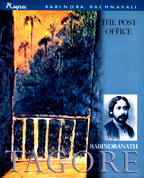Shesher Kabita(B)
The novel recounts the love story of Amit Ray (pronounced "amito rAy"), a barrister educated at Oxford, whose virulent intellectualism reveals itself in its opposition to all forms of tradition. He meets Labannya in a car accident and the romance builds up in the misty hills of Shillong. Though the novel is primarily set in Shillong, it was written when Rabindranath was in Bangalore. Amito's iconoclastism meets Labannya's sincere simplicity through a series of dialogues and poems that they write for each other.
The novel also contains a self-reference of significance in Bangla literature. By the late 1920s, more than a decade after his Nobel Prize, Tagore had become a towering presence in Bengal, and was facing criticism:
A younger group of writers were trying to escape from the penumbra of Rabindranath, often by tilting at him and his work. In 1928 he decided to call a meeting of writers at Jorasanko and hear them debate the issues.[1]
Shortly after this meeting, while writing this novel, Tagore has Amito railing against a much revered poet, whose name turns out to be Rabi Thakur - Rabi is a common short form of Rabindranath, and Thakur is the original Bangla for Tagore. Amito remarks: "Poets must live for at most five years. ... Our severest complaint against Rabi Thakur is that like Wordsworth, he is illicitly staying alive."[2] These remarks aroused much mirth among the reading public, but the novel is also a serious attempt at demonstrating his versatility, at age 67.
Even the theme was novel - after building up their affair and obtaining the blessings of Labannya's employer Jogmayadevi (Labannya served as her daughter's governess but they shared a very close relationship and she was considered Labannya's real guardian), the lovers decide to marry other suitors, without the air of tragedy. In the text, the reason appears to be that they feel that daily chores of living together will kill the purity of their romance:
Most barbarians equate marriage with the union, and look upon the real union thereafter with contempt.[3]... ketakI and I - our love is like water in my kalsi (jug) ; I fill it each morning, and use it all day long. But Labannya's love is like a vast lake, not to be brought home, but into which my mind can immerse itself.[4]
However, this surface text is subject to many interpretations. Rabindranath biographer Krishna Kripalini, writes in the foreword of his translation of Shesher Kabita (Farewell my Friend, London 1946):
[Labannya] releases [Amit's] own submerged depth of sincerity, which he finds hard to adjust to... The struggle makes him a curiously pathetic figure... The tragedy is understood by the girl who releases him from his troth and disappears from his life.[5]
The poem "Nirjharini" from the book was later published as a separate poem in the collection of poems known as Mohua.
The novel also contains a self-reference of significance in Bangla literature. By the late 1920s, more than a decade after his Nobel Prize, Tagore had become a towering presence in Bengal, and was facing criticism:
A younger group of writers were trying to escape from the penumbra of Rabindranath, often by tilting at him and his work. In 1928 he decided to call a meeting of writers at Jorasanko and hear them debate the issues.[1]
Shortly after this meeting, while writing this novel, Tagore has Amito railing against a much revered poet, whose name turns out to be Rabi Thakur - Rabi is a common short form of Rabindranath, and Thakur is the original Bangla for Tagore. Amito remarks: "Poets must live for at most five years. ... Our severest complaint against Rabi Thakur is that like Wordsworth, he is illicitly staying alive."[2] These remarks aroused much mirth among the reading public, but the novel is also a serious attempt at demonstrating his versatility, at age 67.
Even the theme was novel - after building up their affair and obtaining the blessings of Labannya's employer Jogmayadevi (Labannya served as her daughter's governess but they shared a very close relationship and she was considered Labannya's real guardian), the lovers decide to marry other suitors, without the air of tragedy. In the text, the reason appears to be that they feel that daily chores of living together will kill the purity of their romance:
Most barbarians equate marriage with the union, and look upon the real union thereafter with contempt.[3]... ketakI and I - our love is like water in my kalsi (jug) ; I fill it each morning, and use it all day long. But Labannya's love is like a vast lake, not to be brought home, but into which my mind can immerse itself.[4]
However, this surface text is subject to many interpretations. Rabindranath biographer Krishna Kripalini, writes in the foreword of his translation of Shesher Kabita (Farewell my Friend, London 1946):
[Labannya] releases [Amit's] own submerged depth of sincerity, which he finds hard to adjust to... The struggle makes him a curiously pathetic figure... The tragedy is understood by the girl who releases him from his troth and disappears from his life.[5]
The poem "Nirjharini" from the book was later published as a separate poem in the collection of poems known as Mohua.
Top rated books in this category










































